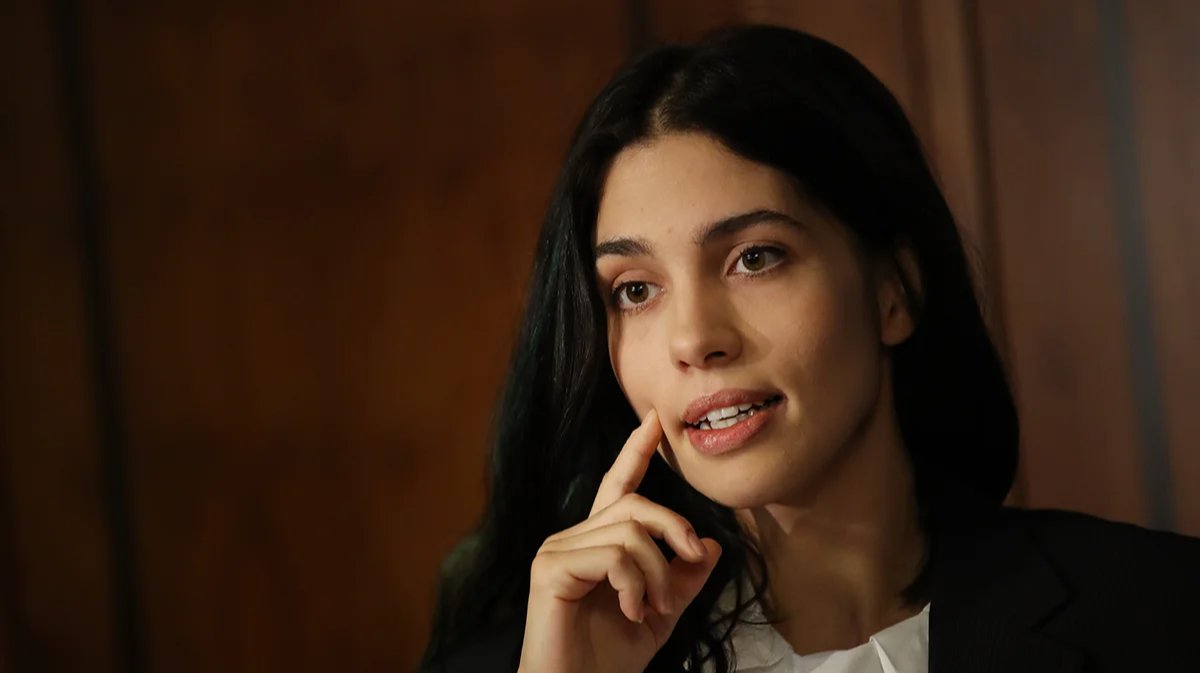On 22 November, Vovan and Lexus, two Russian pranksters now infamous for their fake phone calls, released two recordings of conversations they’d had with Pussy Riot’s Nadezhda Tolokonnikova. Under the impression that she was speaking to Ukrainian President Volodymyr Zelensky and Ukraine’s former Culture Minister Oleksandr Tkachenko, Tolokonnikova discussed her financial support for the Ukrainian Army and expressed her desire to obtain a Ukrainian passport.
Despite Tolokonnikova maintaining that she has always been transparent about her funding of the Ukrainian military, her admission in the prank call that she donated the $7 million she raised at the beginning of the war to the Ukrainian Army caused a furore on social media.
Novaya Europe’s Ilya Azar spoke with her about the controversy, why her recent performance piece “Putin’s Ashes” appears to have hit a nerve in the Kremlin, and why she feels that art is as powerful a weapon as tanks and bullets.
IA: When we were agreeing on this interview, you told me you were distraught over the prank. Were you joking, or did it really upset you that much?
NT: Of course it upset me! When I first realised that none of it was real, I fell into a two-week depression. After that, I recovered, but then they published [the video]. I’d been hoping they wouldn’t, because I didn’t say anything bad.
It upset me so much because I really want to help Ukraine. After the call, I reached out to all my contacts to start helping. I was so hopeful for it all, because if you don’t help Ukraine, then what can you do when your country is a terrorist state?
IA: The fact that the Russian Prosecutor’s Office is investigating you for funding the Ukrainian Army and that you could face up to 20 years in jail probably doesn’t concern you anymore, does it?
NT: They had already brought a criminal case against me before this, so one more won’t be too much of a threat. Just the usual problems of someone who isn’t in Russia, but is facing criminal charges there. There are a lot of us at the moment.
For some reason, [libertarian politician Mikhail] Svetov decided to present ancient news as some sensational new story. But I’d been posting about us donating to the Ukrainian Army since the war started. We have tweets and transactions showing we sent money to Come Back Alive, which partially funds the Ukrainian Army. Then I personally sent money for drones for the unit that was fighting for Bakhmut at that time, and I was always public and open about collecting donations.
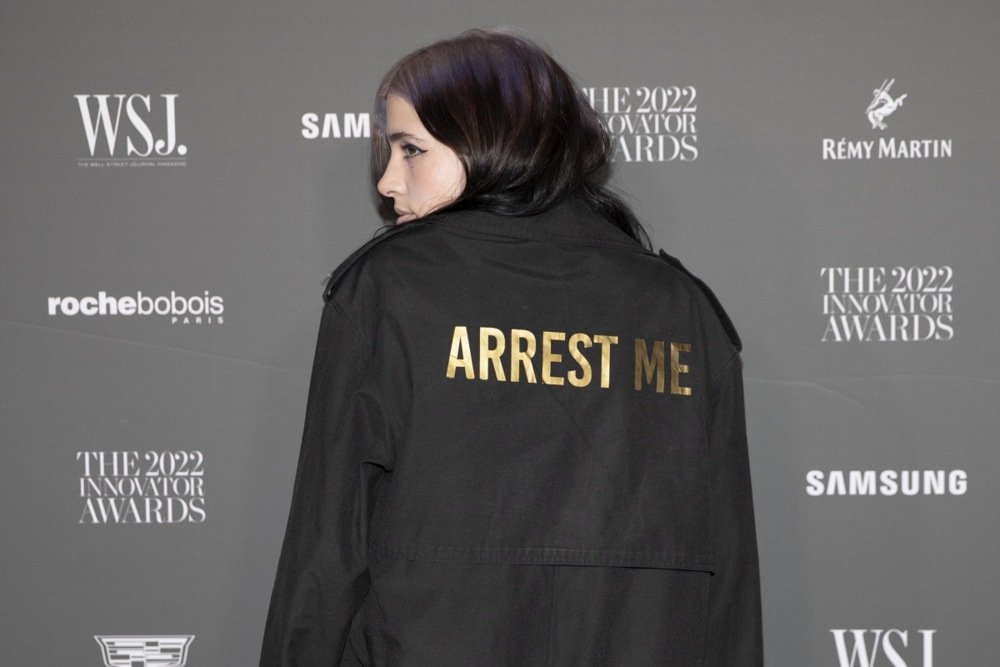
Nadya Tolokonnikova attends the WSJ Magazine 2022 Innovator Awards at The Museum of Modern Art in New York, 2 November 2022. Photo: EPA-EFE/SARAH YENESEL
IA: Why do you think supporting the Ukrainian Army remains such an uncomfortable topic for members of the Russian opposition?
NT: It’s hard to say, and I can only really speak for myself. It was clear to me from the beginning that if someone attacks you, you can’t just turn the other cheek. Especially if you’re being killed.
It’s important to understand that we raised the $7 million when the war had only just started and there were no established rules on who we could and couldn’t donate to.
Fortunately, now the European and American establishments are helping Ukraine, but back then, most people I approached were afraid. They thought that if the country they live in didn’t end up supporting Ukraine, then donating might become a crime and they would be illegally sponsoring a military operation.
I talked to a lot of people from Ukraine at that time. My personal opinion wasn’t as important to me as figuring out how to help Ukraine. What concerned me was how I could help most effectively as an outsider. Most of my friends were being shelled in Kyiv at the time, and they told me the most effective way to help would be by donating either directly to Ukraine or to Come Back Alive, because by then they already had a good track record. I just followed the advice of my Ukrainian friends.
Maybe it helps that I’m an anarchist and don’t think about that. I want Ukraine to win, and I’ll do absolutely everything necessary for that to happen.
IA: There’s a simple answer: opposition figures who left Russia but still plan to return one day think that publicly donating to the Ukrainian Army could jeopardise their political career, even in a post-Putin Russia.
NT: Maybe. That makes things easier for me, of course, because if you’re an artist, you don’t need to think about your political career.
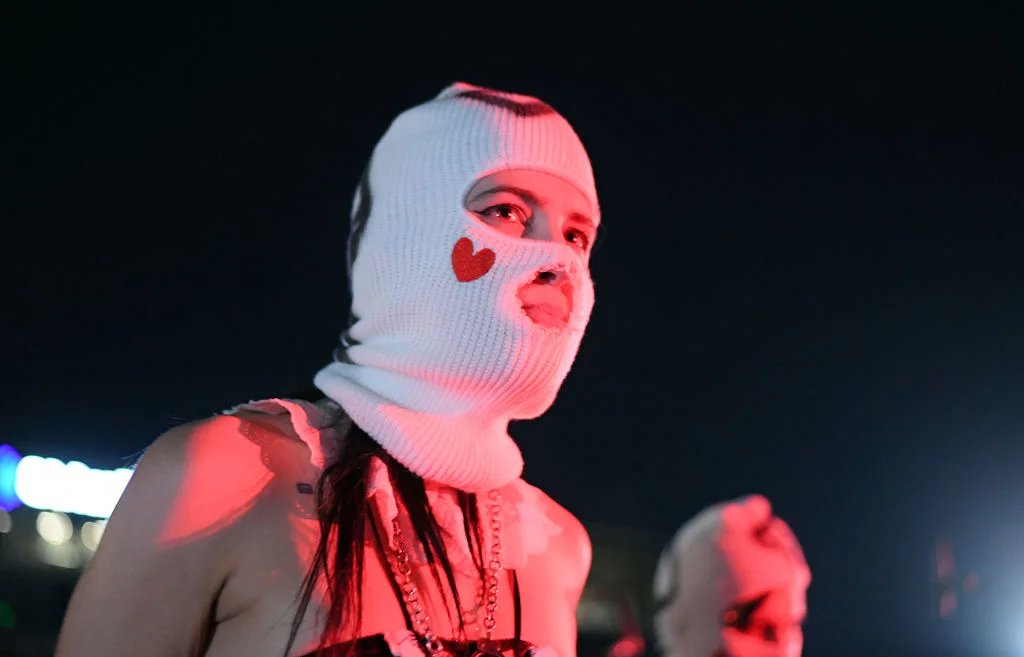
Nadezhda Tolokonnikova at the opening of the “Putin’s Ashes” exhibit in Los Angeles, 27 January 2023. Photo: Michael Tullberg / Getty Images
IA: You also said that “there’s no place for pacifism” now, but isn’t there always a place for it?
NT: When did I say that?
IA: In the prank.
NT: Look, that was in a private conversation. I don’t know how appropriate it is to present it as someone’s official position.
IA: It might not be appropriate, but that’s how it’s being presented.
NT: Of course I believe there’s a place for pacifism. But what I meant was the concept of “bloody pacifism”. It’s this “bloody pacifism” that’s causing pain for so many Ukrainians.
People who say “We’re not going to donate to the Ukrainian Army and we don’t want our country to contribute to the war by giving Ukraine tanks and planes, because we’re pacifists,” [are wrong]. But let Ukrainians be the ones to say that, not me on their behalf. My role is small: I prefer to do, not say.
IA: It’s been a while since you raised the $7 million. Even though the campaign was a great success, you haven’t publicly collected donations since. Why not?
NT: I’ve been helping privately, but I can’t talk about that. At the start of this year, we had a big performance called “Putin’s Ashes”, where we burned a portrait of Putin and collected its ashes. Shepard Fairey designed the poster for it. We sold posters and sent the money to the Ukrainian Army unit that was fighting for Bakhmut. That’s what we did publicly.
I’m only human, I’m not a magician. Whatever you do, it’s never enough. I try not to follow that logic and just do what I can.
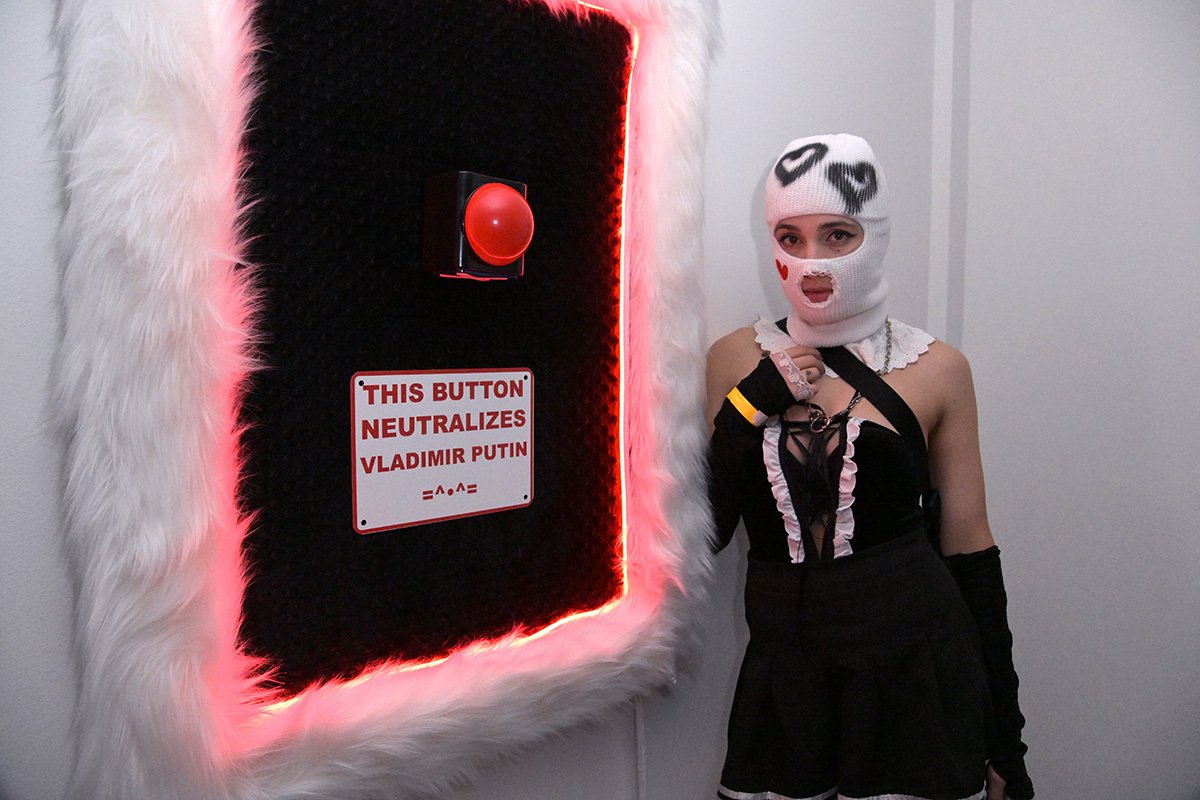
Photo by Michael Tullberg / Getty Images
IA: You’ve probably noticed that American and European officials are urging Ukraine to start peace talks. What do you think about that?
NT: Of course, the war has dragged on, and I think a lot [of Western politicians] find it hard because they have a real electorate who they’re accountable to. So it’s probably increasingly hard for them to justify [the spending]. But I think it’s still as necessary now as it was when the war started. Fortunately, there are some Western politicians who agree. I hope the support will continue. Otherwise it’s just unfair.
Plus, Zelensky has spoken about this a lot — the real Zelensky, that is [smiles]. This war isn’t just Russia against Ukraine, it’s Putin against democracy and against the very idea that you can try to build a democratic society. Democracy is like philosophy.
If philosophy is the love of wisdom, then I think democracy is the love of ideals.
Critics will say that there’s no genuine, 100% democracy anywhere. That’s true, but there is an ideal. Putin is doing everything he can to destroy that ideal and replace it with cynicism and the law of the strong. That’s why I think it’s important for countries that consider themselves democracies and want to strive towards that ideal to support Ukraine.
IA: What did you think when Russia opened another criminal case against you for insulting religious feelings? Did it feel like Groundhog Day?
NT: It was funny, because that case wasn’t about insulting religious feelings, it was about insulting one person: Vladimir Putin. They dug the case up out of a dark cupboard earlier this year when I announced I was holding an exhibition called "Putin's Ashes" at Jeffrey Deitch’s big gallery.
Putin is known to be very superstitious, and clearly either he or someone in his circle didn’t like the idea of rituals with Putin's ashes being held on such a large scale. That’s when this case, which was opened a pretty long time ago, was resurrected.
It’s funny because they wrote the law about insulting religious feelings in response to the Pussy Riot performance in 2013, when we were already in prison. Even the government knew that they didn’t have a real charge to convict us with. The hooliganism charge was a real stretch, and the authorities admitted that by introducing this law.
So, 10 years later, they’ve brought a case against me under the article that’s referred to in the English-speaking press as the Pussy Riot law.
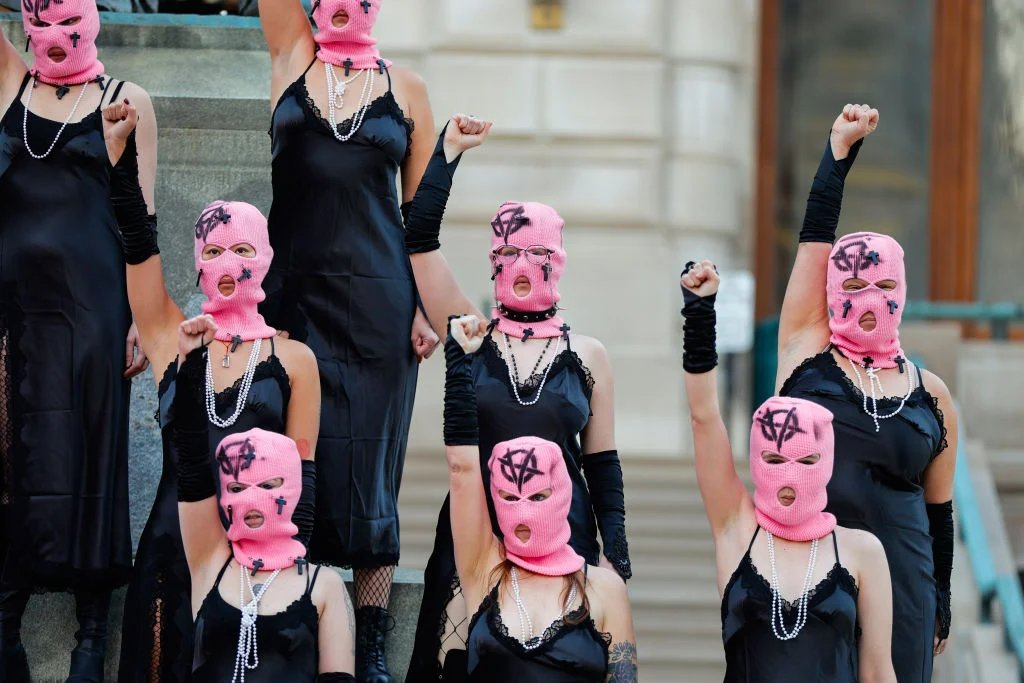
Pussy Riot’s protest art action GOD SAVE ABORTION at Indiana’s Supreme Court. Photo: Jeremy Hogan / SOPA Images / LightRocket / Getty Images
IA: You told Variety magazine that your goal is to become Putin’s biggest pain in the ass, and in another interview, you said that your job is to cause him as much pain as possible. Are you sure he’s following your work so closely?
NT: No, I don’t think he is, though he knew about our early performances and the Punk Prayer, as he talked about them with Angela Merkel.
What I meant was that I want to become the voice of the people in Russia who are very actively protesting against Putin and have been for a long time, and also the voice of the people who are against the war in Ukraine.
I think Russian propaganda finds it very important to portray Russian society as homogenous and everyone in Russia as horrible, wild orcs who support the war. I see the goal of my art, in particular, as to give a voice to the people who don’t agree with that. People who aren’t evil Putin orcs.
I think the louder you shout about this, the more painful it is for Putin, because it undermines his propaganda. That’s what I meant by “causing him pain”. But he doesn’t even know how to use the internet, so it’s unlikely he’s seen my performances.
IA: I read your recent column in The Guardian about jailed anti-war artist Sasha Skochilenko. You write that the process of overthrowing Putin might take too long, so the best way to free her is through an international exchange. Do you think that’s even possible?
NT: It worked before with Soviet dissidents, and recently with Brittney Griner. I know [Griner] is an American citizen, and that makes it easier, of course, but I’ve heard a lot of discussions about a potential exchange involving Alexey Navalny and Vladimir Kara-Murza. I think Sasha Skochilenko should be added to that list.
IA: There are a lot of people you can add.
NT: Sasha really resonated with me. It was such a pure gesture and she’s such a pure person. But I agree with you, of course. There are a lot of people you can and should add.
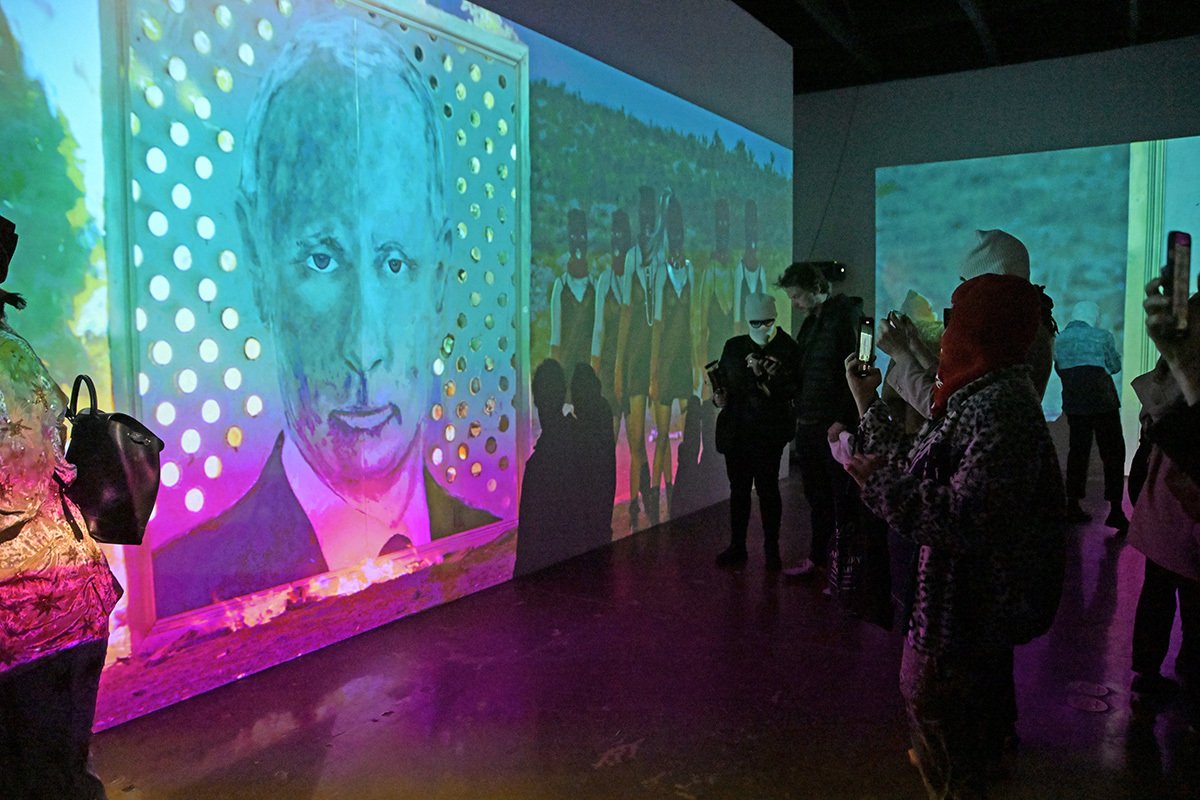
Photo by Michael Tullberg / Getty Images
IA: You mentioned in one of your interviews that you believe art is a weapon that can be more powerful than tanks and bullets because it can influence not only the body but also the mind. Your Pussy Riot bandmate Maria Alyokhina also said that art has the potential to defeat totalitarianism. Where does this belief come from? There’s no evidence for that, is there?
NT: There is. For example, Anatoly Marchenko, a Soviet dissident. He died many years ago, but managed to write a book called “My Testimony”, which was given to me in secret while I was in jail in Mordovia. Unfortunately, Marchenko died on hunger strike in the very same prison hospital in Barashevo where I was also placed during my hunger strike. But his book outlived him and gave me the strength to keep going.
And I think you can find a lot of examples like that. You never know how your work will resonate 50 or 100 years from now.
We’re not saying that art has the power to directly overthrow a government or stop a war right this second. Of course it doesn’t, it’s soft power.
But that said, I’m convinced that you should do what you do best. Having tried various things in my life, I think what I’m best at is creating performances. So that’s what I do.
Join us in rebuilding Novaya Gazeta Europe
The Russian government has banned independent media. We were forced to leave our country in order to keep doing our job, telling our readers about what is going on Russia, Ukraine and Europe.
We will continue fighting against warfare and dictatorship. We believe that freedom of speech is the most efficient antidote against tyranny. Support us financially to help us fight for peace and freedom.
By clicking the Support button, you agree to the processing of your personal data.
To cancel a regular donation, please write to [email protected]
